Table of Contents
Links play a central role in affiliate marketing. They are an instrumental mechanism for boosting conversions, and in turn, commission earnings. However, that information isn’t something only merchants and affiliates should be privy to.
Consumers have a legal right to know when someone is getting paid as a direct result of a sale. Affiliate disclosure helps maintain ethical practices and trust in the digital marketing industry.
In this post, we’ll explain what affiliate disclosure is and what these disclosures are used for. Then we’ll provide three tips for effectively incorporating them into your content. Let’s get started!
An Introduction to Affiliate Disclosure
The Federal Trade Commission (FTC) is responsible for making sure businesses follow ethical practices. Part of this mission is putting laws and regulations in place for consumer protection. This includes mandating affiliate link disclosures, like the one below:
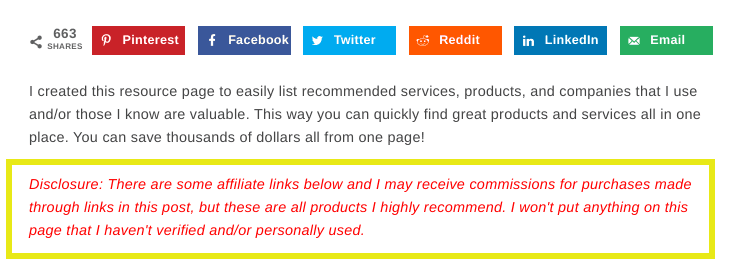
These policies benefit both sellers and buyers. It helps keep a level playing field for marketers and an opportunity to compete fairly. It also facilitates transparency and builds trust with consumers.
Recently, the FTC updated its affiliate disclosure policy and endorsement guidelines to include more disclosures aimed toward social media influencers. Some of the most important highlights that pertain to affiliate marketers include:
- Affiliates must clearly and conspicuously disclose relationships with merchants, brands, or products on their sites.
- Disclosures must be placed close to the “triggering item” or recommendation.
- The disclaimer must be written in language that is clear and understandable.
The FTC continually spot checks for noncompliance and regularly releases new initiatives to crack down on unethical business practices. If you don't properly disclose your affiliate relationships, you run the risk of being reported and fined. Even worse, you could jeopardize your reputation.
3 Tips for Incorporating Affiliate Disclosure in Your Promotions
The good news is that affiliate link disclosure doesn't have to be overly complicated or intimidating. In fact, these disclosures are pretty straightforward and easy to implement. Let's take a look at three tips you can use for incorporating them into your promotions.
1. Use Clear and Direct Language
The language you use to write your disclosures can and should be simple and direct. It's important to keep in mind that consumers may not necessarily know what an “affliate link” means. That's why the FTC requests these notices be clear and easy for anyone to understand.
It's best to avoid complicated or fancy industry jargon. Aim to be as brief yet specific as possible. The main point you're trying to communicate is that you may receive payment as a direct result of the sale.
It's worth noting that your payment doesn't have to be a monetary commission. The FTC recognizes the need to disclose any fringe benefits, such as free products or vacations. Therefore, you may consider using words such as “compensation” that encompass all types of perks.
Let's take a look at two examples of affiliate disclosure. Here's one that is not only wordy, but doesn't put the mention of compensation at the beginning:

On the other hand, the following is an example of an affiliate link disclosure that would be considered acceptable. It reveals compensation early and gets right to the point:

If you're running an affiliate program, it's helpful to visibly display disclosure guidelines for your affiliates to use. This way you can feel confident knowing they are using correct, compliant language.
Our Easy Affiliate plugin can help with this. You can create custom navigation pages, including one for affiliate disclosure guidelines, and post them to the Affiliate dashboard:
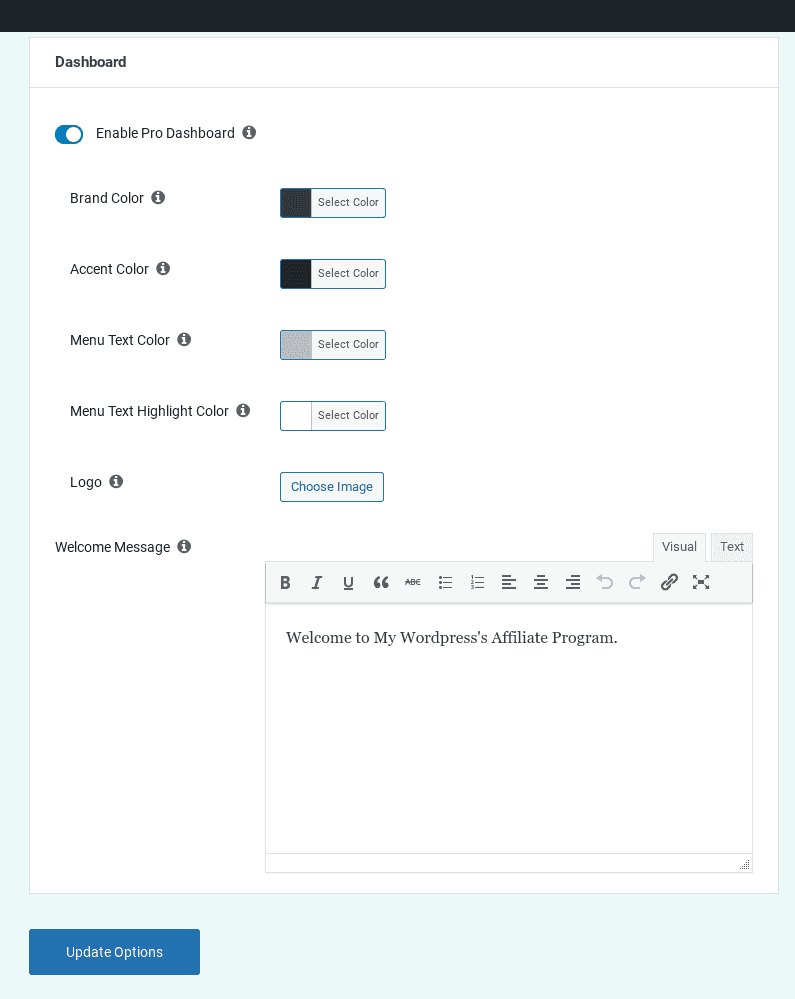
Then, when your affiliates log into their accounts, this information will be visible and accessible:
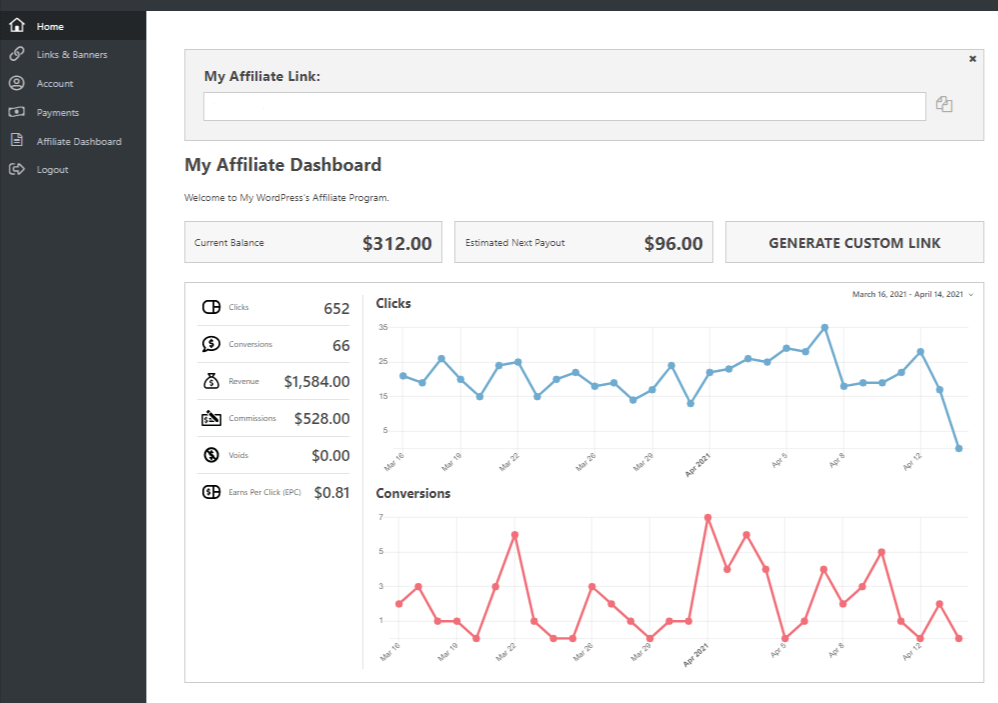
2. Make Sure Link Disclosures Are Prominently Placed and Accessible
Another crucial aspect of affiliate disclosure is placement. Per FTC guidelines, disclosures must be in obvious places, meaning easy to see and virtually impossible to miss.
Ideally, they should be made before the endorsement to precede consumer purchasing decisions. Putting a disclaimer at the bottom of a blog, for example, is not acceptable. The closer the disclosure is to the “triggering item” – such as an affiliate link or product recommendation – the better.
To err on the safe side, you might consider adding a disclosure to the top of all your blog posts. What you want to avoid is burying them in the footer or “About Me” page. They should be on any and all pages that contain affiliate links:
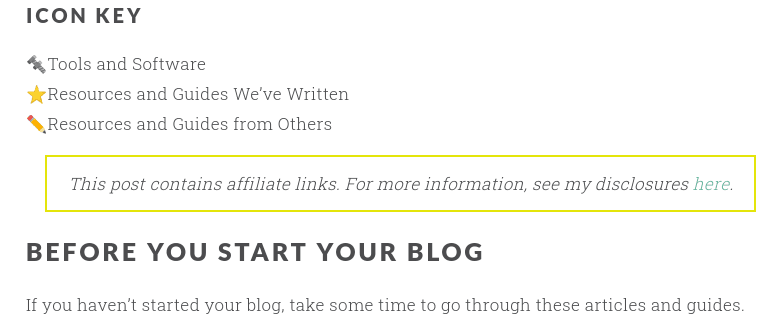
How you format disclosures is as important as where you place them on your site. They should be visible on all devices and not obscured from mobile screens.
The FTC also warns against hiding disclosures behind vague and poorly labeled hyperlinks such as “Terms of Service” or “Disclaimer”. Instead, you might consider something along the lines of, “This post contains affiliate links. Click here for the full disclosure statement.”
To make setting up affiliate link disclosure easier, we recommend using a tool such as Pretty Links:
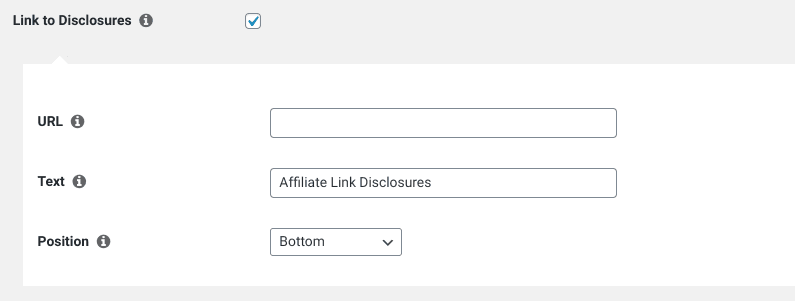
This plugin helps you disclose affiliate marketing relationships on any page or post. After you install and activate it, you'll be able to use it to customize URLs and specify the affiliate disclosure placement.
3. Add Relevant Hashtags on Affiliate Social Media Posts
As we mentioned earlier, the FTC recently released new updates to its guidelines specific to social media. To summarize, you can't use abbreviated versions of hashtags as a disclosure. Examples of this include #spon and #collab.
The FTC is actually relatively lenient as far as acceptable words and hashtags you can use. However, they must clarify to readers that you're being compensated in some way for your post.
You may want to steer clear of only using #affiliate because, again, consumers may not know what that means. Acceptable hashtags include #sponsored, #promotion, #paidad, or #ad:

The FTC doesn't necessarily care where in the post caption the disclosure is used. It does, however, emphasize that it shouldn't be buried in a sea of other hashtags.
Conclusion
If you’re new to affiliate marketing, it’s essential to learn pertinent policies and best practices. Increasing transparency and trust only serves to benefit all parties involved.
As we discussed in this article, three tips for effective affiliate disclosure includes:
- Using clear and direct language.
- Making sure disclosures are prominently placed and accessible.
- Adding relevant hashtags on social media posts.
Do you have any questions about affiliate disclosure? Let us know in the comments section below!
If you liked this post, be sure to follow us on Twitter, Facebook, and LinkedIn! And don't forget to subscribe in the box below.



If I have an affiliate disclosure statement on my wordpress site that has affiliate links in the blog post and I share that post to Facebook, do I need to put hastags or a disclosure on the facebook post?
Hi there! Yes, you should also disclose that you are using an affiliate link in your social media post. You can use a hashtag like #ad to disclose or simply mention that you are using an affiliate link. Check out the Endorsement Guides from the Federal Trade Commission for more information: https://www.ftc.gov/tips-advice/business-center/guidance/ftcs-endorsement-guides-what-people-are-asking.